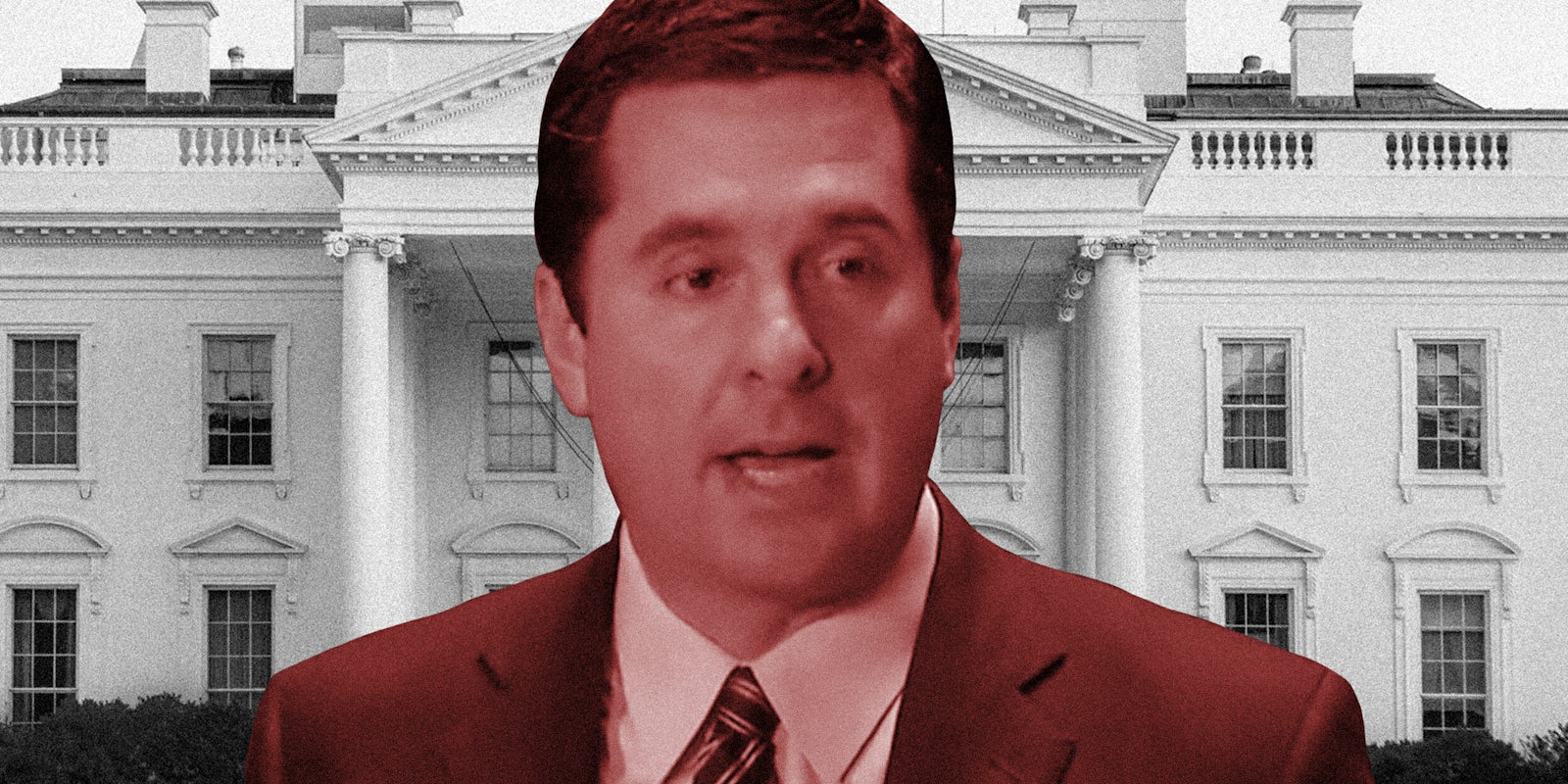Chairman Devin Nunes apparently lied this week during a news interview in which he claimed there were no White House staffers involved in leaking him classified surveillance material.
The New York Times reported on Thursday that two of President Donald Trump’s men were involved: Michael Ellis, an assistant White House counsel, and Ezra Cohen, the senior director for intelligence at the National Security Council (NSC). A third, implicated by the Washington Post on Thursday night, is John Eisenberg, the NSC’s top legal advisor; Eisenberg reports to Donald McGahn, the White House counsel.
Nunes, in a Bloomberg interview on Monday, said that none of his sources worked at the White House. In a follow-up on Thursday night, reporter Eli Lake, whose article about the California Republican carried the claim, wrote: “It turns out, he misled me.”
Ultimately, Lake argued, Nunes had played himself.
“Sadly, the merits of this case are undermined by how the White House and Nunes have made it. The chairman is better than this,” he wrote. “By misrepresenting how he obtained information worthy of investigation he has handed his opposition the means to discredit it.”
But whether the reports seen by Nunes are truly worthy of investigating is difficult to say. No one else who has seen them is talking. What’s more, Nunes’s more recent accounts of what the reports hold differs from his original account, making it increasingly difficult to deduce the contents.
Initially, Nunes, a former Trump campaign advisor, claimed that it was “possible” the president’s personal communications had been swept up by the National Security Agency, the byproduct of lawful surveillance targeting non-U.S. citizens. While he seemed alarmed, he appeared less certain of the significance. Quite possibly, Trump and his associates were simply referenced in the conversations of foreigners, in what seems like an inevitability, really, given the number of Trump officials with financial ties overseas.
Repeatedly canceling committee hearings on Russia, Nunes’s new purpose seems to be elevating suspicions that the intelligence community may have failed to properly “mask” the names of Trump associates in the classified reports. Redaction is usually standard protocol when an American is mentioned in a foreign surveillance report—unless concealing their identity somehow lessens the report’s value. The implication Nunes is touting seems clear: Did vindictive Obama staffers with top-secret clearance ignore the protocol so they could expose the Trump administration to scandal?
Nunes has repeatedly insisted that the intercepts are wholly unrelated to Russia. Yet, House Speaker Paul Ryan on Thursday assured the public that Nunes did find the reports “valuable” to his committee’s probe. In fact, Ryan said, “I told him to add it to his investigation.” A few hours later, Nunes ventured over to the White House to brief the president about the intercepts—something Ryan said that he “already knew” Nunes was planning to do.
In a blog post Thursday night, reporter Barton Gellman, whose work on the “Snowden documents” won a Pulitzer for the Post, encapsulated the growing concern that Nunes might’ve broken the law when he described to reporters portions of the intelligence. “There is no unclassified way to speak in public about the identity of a target or an ‘incidentally collected’ communicant in a surveillance operation,” Gellman said, arguing further that the White House staffers—Ellis and Cohen—may have also violated secrecy laws, as well as a non-disclosure agreement pertaining to classified information.
“The offense, which in some cases can be prosecuted as a felony,” Gellman wrote, “would apply even if the White House officials showed Nunes only ‘tearsheet’ summaries of the surveillance reports. Based on what Nunes has said in public, they appear to have showed him the more sensitive verbatim transcripts.”


